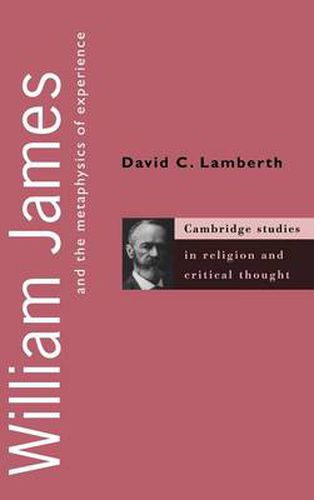Readings Newsletter
Become a Readings Member to make your shopping experience even easier.
Sign in or sign up for free!
You’re not far away from qualifying for FREE standard shipping within Australia
You’ve qualified for FREE standard shipping within Australia
The cart is loading…






William James is frequently considered one of America’s most important philosophers, as well as a foundational thinker for the study of religion. Despite his reputation as the founder of pragmatism, he is rarely considered a serious philosopher or religious thinker. In this new interpretation David Lamberth argues that James’s major contribution was to develop a systematic metaphysics of experience integrally related to his developing pluralistic and social religious ideas. Lamberth systematically interprets James’s radically empiricist world-view and argues for an early dating (1895) for his commitment to the metaphysics of radical empiricism. He offers a close reading of Varieties of Religious Experience; and concludes by connecting James’s ideas about experience, pluralism, and truth to current debates in philosophy, the philosophy of religion, and theology, suggesting James’s functional, experiential metaphysics as a conceptual aide in bridging the social and interpretive with the immediate and concrete while avoiding naive realism.
$9.00 standard shipping within Australia
FREE standard shipping within Australia for orders over $100.00
Express & International shipping calculated at checkout
William James is frequently considered one of America’s most important philosophers, as well as a foundational thinker for the study of religion. Despite his reputation as the founder of pragmatism, he is rarely considered a serious philosopher or religious thinker. In this new interpretation David Lamberth argues that James’s major contribution was to develop a systematic metaphysics of experience integrally related to his developing pluralistic and social religious ideas. Lamberth systematically interprets James’s radically empiricist world-view and argues for an early dating (1895) for his commitment to the metaphysics of radical empiricism. He offers a close reading of Varieties of Religious Experience; and concludes by connecting James’s ideas about experience, pluralism, and truth to current debates in philosophy, the philosophy of religion, and theology, suggesting James’s functional, experiential metaphysics as a conceptual aide in bridging the social and interpretive with the immediate and concrete while avoiding naive realism.